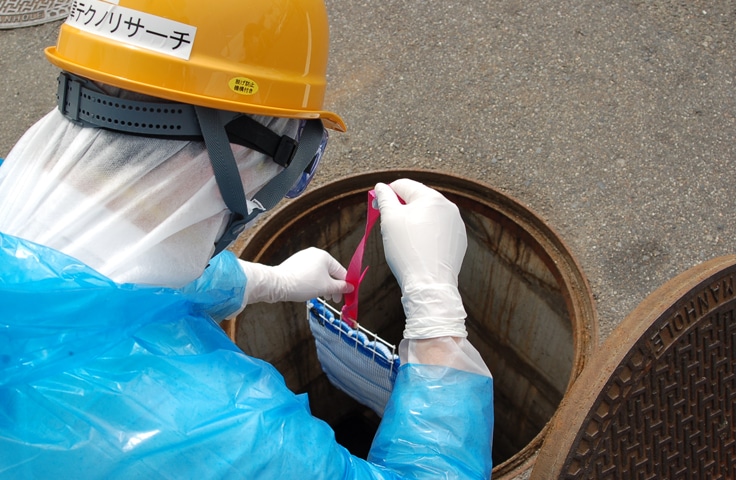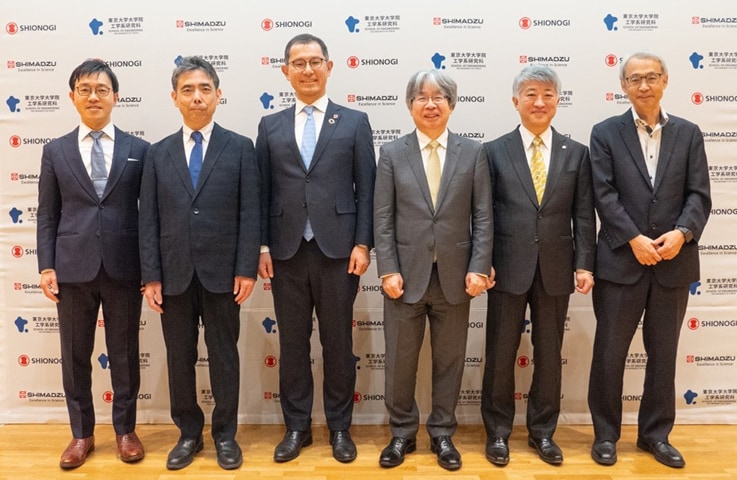Toward a Future when Pandemics can be Prevented
Corporate Sponsored Research Program Established in Collaboration with The University of Tokyo and Shionogi
The Shimadzu Group has been developing new solutions for a variety of infectious disease crises. Shimadzu is also involved in various collaborative projects with government, academic, and private sector organizations to broadly adopt those solutions in society more quickly. The following describes one such project.
Epidemiological Surveys of Sewer Water for Early Detection of Infectious Disease Epidemics
Ever since the SARS-CoV-2 coronavirus outbreak, researchers around the world have been engaged in a variety of research work on infectious diseases. One project that is attracting particular interest is the Epidemiological Survey of Sewer Water (Wastewater Surveillance).
Epidemiological surveying of sewer water is technology for determining the status of infectious disease epidemics by surveying the pathogens present in the sewer water of specific cities or facilities. It detects pathogens in the feces of people infected with a coronavirus before they develop any symptoms. Therefore, by surveying the effluent water, the infection status of individual facilities can be monitored to evaluate the status of epidemics or judge whether epidemics are receding.
Because testing effluent water does not require acquiring samples from people like PCR testing does, which reduces the burden on individuals, and allows testing a whole group at one time, it is anticipated as a next-generation method for surveying infection status and implementing countermeasures.

Installing an effluent collection device in a manhole (Source: Shimadzu Techno-Research)
In Europe and the United States, sewer water epidemiological survey results are already being used for early detection of epidemics and to determine whether they are receding, but Japan and other Asian countries are said to be in the study and research stage of preparation for broad implementation within society. In Japan, systems and guidelines for surveying effluents are currently being established in an effort to achieve broad adoption in society as soon as possible.
Aiming to Establish a Foundation for International Cooperation through Industry-Academia Collaboration

Presentation speakers included (from the left) Project Professor Kitajima, Professor Katayama, Innovation Fellow Kobayashi, Professor Kato (Dean of the School of Engineering), Shimadzu Managing Executive Officer Matoba, and Director Takizawa.
In April 2024, the Graduate School of Engineering at The University of Tokyo (“The University of Tokyo” below), Shionogi & Co., Ltd., and Shimadzu Corporation established a corporate sponsored research program entitled “International Wastewater-based Epidemiology.” The collaboration between private-sector companies and the university is intended to increase the speed of research and feasibility validation to ensure the technology is broadly used in society as soon as possible.
The EPISENS-S method developed by Project Professor Kitajima involves collecting solid sediments centrifuged from sewer water samples, extracting RNA, conducting a reverse transcription pre-amplification reaction, and then measuring the concentration of virus RNAs by quantitative PCR. The improved EPISENS-M method offers better reliability and higher sensitivity detection of virus RNA in sewer water than the EPISENS-S method by changing from a sewer water centrifugal separation process to a negatively charged membrane filtration process.
In the new program, this and other technologies will be used to validate the feasibility of the system. In addition to surveying effluents from individual facilities, such as wastewater treatment plants, hospitals, and geriatric health facilities, the system will also be used to survey wastewater from airports and passenger planes. The ability to detect viruses from people without any symptoms means it can determine their infection status from a few to 7 days before they develop symptoms. The system also contributes to implementing border countermeasures more quickly, such as by issuing alerts and emergency orders before pathogens introduced from abroad can cause an epidemic within Japan. In order to prepare for the inevitable future pandemics that are predicted to occur, we also intend to establish an international cooperative system for sharing information among all countries. Furthermore, by engaging in activities to propose the technology to the International Organization for Standardization (ISO) to establish a Japan-originated international standard for epidemiological surveys of sewer water.
Comments from the Person in Charge of the Project at Shimadzu
To prevent explosive expansion of various infectious diseases, it is important to prepare for epidemics daily by using a wastewater surveillance system that can detect pathogens as early as possible. Therefore, Shimadzu remains committed to ensuring that such wastewater surveillance systems will be broadly adopted throughout society using Shimadzu's analytical instrument and reagent technology.
Related Links
- Laboratory of International Wastewater-based Epidemiology Established at the school of Engineering, the University of Tokyo | News & Notices
- SHIMADZU and SHIONOGI establishes joint venture AdvanSentinel
- Solving social issues via public health risk assessment, including wastewater surveillance - | News & Notices
 Page Title and URL Copied.
Page Title and URL Copied.


